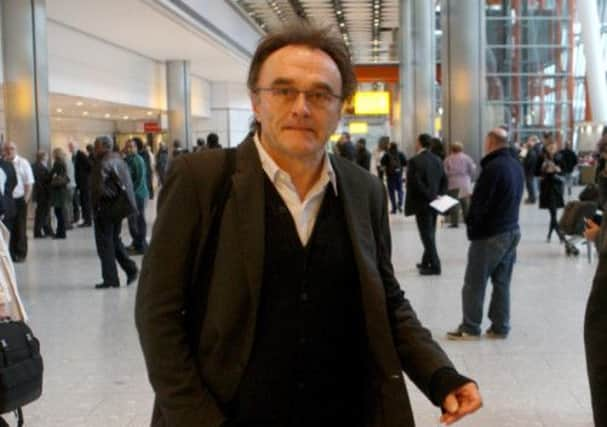Danny Boyle: ‘I like my films to be visceral – to burst right through the door at the beginning’


“I’ve been at the dentist’s all morning so I’m not in a very good mood. Tell me what you want.”
Danny Boyle smiles as he recalls his greeting from the Queen for what was one of the most iconic moments of London 2012: Her Majesty teams up with Commander James Bond. Neither he nor his team had any real expectation that a cheeky request to enlist the nation’s monarch in the Olympics celebrations would lead to anything tangible.
Advertisement
Hide AdAdvertisement
Hide AdYet, there he was, face to face with Elizabeth II in the room where she greets her Prime Minister for a weekly conference. It was a no-nonsense moment that had the potential to ruin everything that came after. Yet Boyle, with 007 himself, aka Daniel Craig, managed to pull it off.


“We were applying for their courtesy – their permission to let us cast a double,” remembers Boyle. “We were astonished when they came back and said, ‘Not only do we approve of this idea but she wants to be in it’. The only criterion was that she wanted to keep it a secret.
“It didn’t last very long [and] she didn’t need telling twice. She’s as sharp as anything. I think she did it because her team had a lovely day out with Daniel Craig. They’re just like us: it’s a movie star – James Bond in the room. She made sure that all of her staff got their photo with Daniel.
“It was great because the feeling of the whole show was communal. She played a part in that.”
Advertisement
Hide AdAdvertisement
Hide AdBoyle is not one to gush and his recollections of a unique moment in history are related in measured tones. It was a job, pure and simple. It didn’t matter that he was calling “Action” on the Queen; what mattered was ensuring everyone was on the right wavelength.
After a career in theatre and television, Boyle entered movies in 1994 with Shallow Grave. In the years since. his reputation as a modish filmmaker of style, intellectual rigour, discipline, and with an uncanny knack of second-guessing audience tastes, has grown exponentially.
The success of the Olympics’ opening ceremony only served to enhance his standing as the reigning king of British indie movies – something even an Oscar failed to sully.
His latest is Trance, the twisty-turny tale of an auctioneer who is hypnotised by an art thief seeking to recover a priceless Goya painting. James McAvoy is the hero, Vincent Cassel the villain, Rosario Dawson the elegantly manipulative hypnotist who gradually reveals her own agenda.
Advertisement
Hide AdAdvertisement
Hide AdBoyle doesn’t make Hollywood films. Even as he heads towards his sixties – he’s 56 – his pictures retain a frenetic, pop promo aesthetic that underpins the drama, acting and scripting.
Trance is co-written by John Hodge, Boyle’s former collaborator on Shallow Grave, Trainspotting and A Life Less Ordinary. The movie begins with a voiceover. Then it’s a pell-mell pelt into the story.
“I like films to be visceral – to burst in the door at the beginning,” says the one-time punk. “There’s no apology for them arriving. It’s like ‘Wow, here you go! Boom, boom, boom.’ I don’t want you to do too much work at the beginning because I like to go ‘Whoa! This is the film!’ and then gradually you’re asked to do a bit more work.
“That kind of style is inevitably there beforehand, a bit, but you try and find the absolute style of the film from the story, if you can. I think I work a bit differently on each film. You get older on each film, you come off different experiences but I try to be communal, that’s the main thing.”
Advertisement
Hide AdAdvertisement
Hide AdClearly the notion of community is crucial to understanding Doyle and how he operates. It was the idea of building a national community spirit that prompted him to undertake the Olympics’ opening – a job he attacked with zeal.
“Trance is a deeply divisive story; they’re all working against each other, you’re not quite sure who’s for whom, who’s double-crossing whom, who’s manipulating whom. But I try to work in a communal way in that I set the story up as a voyage that we’re all going on. I’m kind of evangelical about that.
“I try and sell the film to people. I ask them to take less money than they might be able to make elsewhere because then we keep control of its deviousness.
“People turn out to be not what they seem; it’s difficult to pick the character you should root for, which is the classic studio totem that they believe in – there must be somebody to root for. But you can contradict them and be a bit more devious about it if you keep your price down.”
Advertisement
Hide AdAdvertisement
Hide AdThere is a socialist leaning to Boyle that has kept him out of big American blockbusters. He was tempted once, back in the 1990s, when he was offered the chance to helm the fourth entry in the Alien franchise. He turned it down and in the years since has adhered to a self-imposed ceiling on his films’ budgets of $20m
Making such modestly priced projects (at least in Hollywood terms) means he has continued to maintain his individuality and that fiercely defended independence. He remains loyal to producing partner Christian Colson; both men won Academy Awards for Slumdog Millionaire and his decision to turn down a knighthood following London 2012 saying he was uncomfortable being the sole focus of an honour for what had been a massive team effort says a lot about his style.
He also appears to be largely unaffected by the trappings that come with being almost a national treasure, an Oscar-winner and unlikely babe magnet – he romanced his 33-year-old Trance leading lady Rosario Dawson for several months after the film wrapped.
“If you go above [that $20m figure] it’s very different and the rules that apply are to do with hard economics. Projects above that level tend to be star-driven. We think of them as dumb but Hollywood is full of really smart people. We got a lot of people approaching us in the early days but after a while they gave up.”
Advertisement
Hide AdAdvertisement
Hide AdIs he actively trying to avoid the dead hand of the studio system – the same iron fist that can wrest a movie from its director when things go wrong?
“Yeah. That would happen anyway if you really f*** it up at whatever level you’re doing it at. It manifests itself in different ways. If the property is very valuable and has cost a lot of money they quite rightly will take it off you, understandably.
“It’s ludicrous: people expect to borrow $100m off somebody and then not expect the person who’s lent it to them to express an opinion!
“Twenty million dollars is still a lot of money and you should be able to make a film for that. We made Shallow Grave for a million quid and a decent one, as well. So there’s always that pressure. It does help both financially if you get people on board but it helps the feeling of the film – that it’s an adventure you’re going on – if you have that evangelical spirit early on.”
Advertisement
Hide AdAdvertisement
Hide AdOur interview takes place on Budget Day. The arts have been among the “non vital” public services that have suffered under the austerity measures. Do people appreciate the benefits of the arts and what might the future hold as more funding is cut?
“It’s clear that culture, in a post-industrial society, is a huge advantage we have.
“Doing the opening ceremony was interesting because you work with a lot of people from abroad and they find our culture riveting.
“The South East Asian economies... it’s one of the big concerns they have because although they have the mechanisation of an industrial process their concern is about innovation, which is the spark where creativity comes from.
Advertisement
Hide AdAdvertisement
Hide Ad“We celebrated it in the opening ceremony with [World Wide Web creator] Tim Berners-Lee – that BANG idea. The Asian economies are concerned about it and how to generate that because it’s tough. You realise that you can’t order it up when you need it. It’s something that’s long gestated.
“Our cultural life is something that does enhance it and so it’s very dangerous to damage that in the way that it is exercised. Me, Stephen Daldry, Sam Mendes… we all came out of regional theatres but that’s 30 years ago [when we] were given that advantage. If you don’t spend that money then in 30 years’ time there is a danger that the people who are being nurtured now may not appear.
“It’s clear that culture needs nourishment from the state or private sponsorship but it does earn that money back many, many times over. But I think also spiritually it’s very difficult for cities and towns to have a community centre.
“The role of the churches has diminished. Pubs have diminished in the old way; they used to be communal places where people shared experiences and information and knowledge and weirdly the way the tentacles of a local community was kept in touch with each other.
Advertisement
Hide AdAdvertisement
Hide Ad“And theatres, however middle-class you think they are, are a way of doing that – a spiritual nourishment as well. People can gather round something that isn’t based around alcohol. That’s probably a good thing.”
Trance (15) is on general release from Wednesday.
Danny Boyle – A life on film
Danny Boyle was born on 20 October 1956 in Radcliffe, Lancashire.
After studying English and drama at Bangor University, he began his career on the stage, directing at both the Royal Court in London and the Royal Shakespeare Company in Stratford.
In the early 1980s, he also began working in television where he directed two episodes of the detective drama Inspector Morse.
Advertisement
Hide AdAdvertisement
Hide AdBoyle’s first film was Shallow Grave, which became the most commercially successful British film of 1995.
By the end of the decade, Boyle had made Trainspotting, A Life Less Ordinary and The Beach, and had declined an offer to direct the fourth film of the Alien franchise.
He has since added the apocalyptic horror 28 Weeks Later, 127 Hours, based on the true story of Aaron Ralston, who was forced to amputate his right arm after becoming tapped in a canyon and the phenomenally successful Slumdog Millionaire to his portfolio.